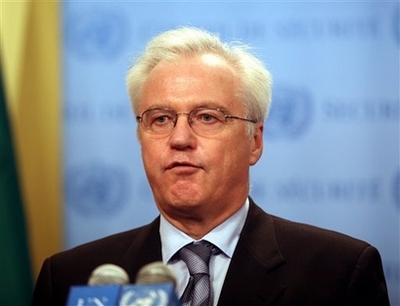Kosovo and the Clash of Civilizations
 Richard Fernandez argues that the rioting by Kosovar Serbs was entirely predictable:
Richard Fernandez argues that the rioting by Kosovar Serbs was entirely predictable:
The wider impact of the Kosovo crisis is the precedent that it sets for many of the “frozen conflicts” of the world, ranging from Azerbaijan to the Basque region. Remarkably, many Muslim countries have refused to recognize Kosovo. And their reluctance is fueled in part by the desire to avoid stirring up separatism. Therefore Kosovo has been sold by the EU and the US as an “exception” to the general rule.
The problem is that the Serbs are taking the cue from the Kosovars. If Kosovo can split from Serbia why can’t Serbian regions split from Kosovo? The EU believed that by throwing a protective blanket of “suits” around the Serbs in the north that Kosovo might be held together. But as the experience of Iraq shows, stabilization can only occur where security is guaranteed. The crisis that will face Western policy in Kosovo is whether they are up to providing “security” which is another word for military force, to back up their “army of suits”. The suits can’t deploy without the uniforms.
Commenter Peter invokes Samuel Huntington’s Clash of Civilizations thesis.
If the Clash of Civilizations occurring along Islamic fault lines is indeed the defining civilizational issue of the 21st Century then recognizing the extra legal independence of Kosovo is a major bonehead move.
[…]
Ideas mean something. Every confrontational success or failure validates the ideas of one side or the other in a zero sum game. What do we benefit by handing a victory of any kind to Islam? There are many arguments that could be made about the vicitmhood of the Kosovors but the creation from nothing of a new Islamic state in Europe is the real story. How many times have we heard of the necessity to fight jihadism on many levels? How is shooting Taliban in Afghansitan while surrendering at the state creation level a good thing?
[…]
As I see it the USA is again trading its goodwill with the Orthodox countries, which are at least in a position to help put the squeeze on Iran and limit long term Islamic influence in the Caspian Basin, for the illusion of goodwill with Islam which has a proven value of exactly zero. In 1999 Sandy Berger admitted that NATO was intervening “for the Muslims.” What did that goodwill get us?
On the more personal level many Serbs consider Kosovo the birthplace of their unique Serbian identity. One of Huntington’s intriguing thoughts was that you could more easily grasp the concepts behind the Clash of Civilizations by overlaying today’s maps with a political map of Central Europe in the 1500s. What we are doing today is kicking the Serbs, and indirectly the other Orthodox countries, in the teeth to expand the Islamic empire. How does that make sense? Do we say “poor little misunderstand Kosovors” and just watch them start (continue) tearing down 1,000 year old Christian monasteries?
While I agree that there is such a thing as Christendom and that it is at odds in parts of Europe with Islam, it seems like more than a stretch to conflate the Albanian Muslims of Kosovo with the Taliban of Aghanistan.
As to the rhetorical question, “What did that goodwill get us?” it’s not entirely clear. Certainly, intervening on the part of Muslims in Bosnia and Kosovo didn’t make al Qaeda like us any more; indeed, it was likely not on their radar screen. But who knows what would have happened in Bosnia and Kosovo — or among Muslim communities elsewhere in Europe — had we not intervened? Perhaps tensions would have exploded and Christian-Muslim relations would now be much worse? (And I say that as one who opposed intervention in both instances.)
During the Cold War, we mistakenly presumed that because nationalist leaders in places like Vietnam and North Korea and Cuba and China deemed themselves “Communist” they were part and parcel of the same global threat as the Soviet Union. To some extent, that became a self-fulfilling prophecy, as our behaving as if that were the case isolated them and sent them scurrying to the USSR for support. But Ho Chi Minh and Fidel Castro and Mao Tse Tung didn’t give a damn about Karl Marx or Joe Stalin; they were nationalists looking for a message with which to rally the support of a nation.
Let’s not make the same mistake again. While there are jihadists who dream of restoring the Ummah, they are a relatively small subset of Muslims. The vast majority of the latter are, as with non-Muslims, more concerned with their daily lives and communities than global aspirations.
As to the particular question of an independent Kosovo, I’m rather torn. As an American — and a Southerner — I’m predisposed to sympathy towards claims for national self-determination. But, as my colleague Dave Schuler frequently asks, “What’s the unit of measure of national sovereignty?” Aside from attempting a case-by-case analysis as with Potter Stewart’s famous definition of pornography, I don’t have an answer.
Story via Kate McMillan. ![]() Photo credit: Foreign and Commonwealth Office
Photo credit: Foreign and Commonwealth Office





As I observed in my post on sovereignty last week, nowhere in American law, meta-law, or policy do we recognize a generalized right to secession.
In the particular case of Kosovo, I believe this is a case of Kosovar opportunists avoiding good faith negotations with Serbia and seizing the day while under the protection of NATO, not a particularly good analogy to our own War of Independence.
“As an American — and a Southerner — I’m predisposed to sympathy towards claims for national self-determination.”
The rub is that the “Albanians” laid claim to Serb land. If these “Albanians” simply broke off a chunk of Albainianland there wouldn’t be such a rub. They didn’t, they took Serb land. This will be another area of never ending fighting.
Albanians have been there for millenia, they didn’t “take” anybody’s lands. Go read some history. Yugoslavia is now dead, Kosovo has never been Serbia’s and according to US State Department, it will never be. Get over it.
?
“Albanians have been there for millenia”
It’s been Serbian as far back as 1190.
I ran into a oh-so-polite commenter like Edvin myself. It seems that some on the Kosovar Albanian side of the debate has been circulating the meme that Kosovo has been Albanian for 5,000 years. This position is a form of invincible ignorance, and if it at all influenced the Kosovar side during negotiations with Serbia, then the talks were doomed from the start.
The population of Kosovo is 92% Muslim Albanian. If freedom is grounded in choice, and sovereignty is grounded in human identity, then the Kosovars deserve their own nation, separate from the people who attempted to ‘cleanse’ them.
I disagree with Dave Schuler’s reading of the Declaration of Independence, which he points us toward in the link to his own blog.
The Declaration lays out the reasons why our founding fathers declared independence and thus defined a set of conditions under which they deemed it proper to do so. The Declaration begins with an assertion that the fundamental rights of man are not derived from any legal system, but come from the Creator – they are inherint human rights. So an assertion of independence is a natural right under a particular set of circumstances. There is no need to make appeal to any legal regime to find a right to assert soverignity.
The Kosovars seem to have as compelling a set of reasons for independence as one can imagine, and a far stronger case than the American colonies had. An overwhelming majority of popular support, compared to the approximate 1/3 support for our Revolution, and a recent history of brutal oppression verging on genocide, as opposed to the imposition of a few higher taxes.
The Serb claims to the land seem to be based on factors that are at odds with basic American values, so I don’t see any reason we should be sympathetic to those claims. We believe, as was written in our Declaration, that the legitimacy of any government derives from the consent of the governed. This is not only an American principle, it also is common sense, in that an unconsenting population will always been in potential revolt and can only be controlled by force. The question of who owned the land at some point in the past is simply not a relevant criterion for any beleiver in democracy.
Granted that the problem remains of how to define the minimal units of legitimate soverignity. Perhaps it does come down to knowing it when we see it, but some of the obvious things we look for are levels of popular support, the nature of the existing regime, the manner in which the restive population has been governed by the reigning power, and the fundamental cultural similarity or difference between the rebel areas and the rulers. Kosovo does not seem like a very difficult case under these standards.
@Tano: What’s the compelling list of reasons for their freedom?
Milosevic and his forces committed ethnic cleansing, this is true. But the KLA also committed ethnic cleansing and it constitutes the bulk of Kosovo’s new government. The Kosovar Albanians don’t want to remain part of Kosovo, this is also true. But no doubt the Kosovar Serbs and Montegrins would like to remain part of Serbia, and had their ranks not been diminished by the KLA perhaps their voices would be louder. Are your two reasons still compelling enough when contrasting facts are considered?
Moreover, have you considered that punishing the Serbs by honoring Kosovo’s secession defeats one of the main postwar goals of the US/NATO, that of liberalizing Serbia proper? That it overturns the trend towards reconciliation after human rights abuses (e.g. South Africa) by basically saying to the Serbs “you are all guilty and incapable of change”? And have you also considered that Kosovar independence may be a violation of international law since UN Res 1244 allows for Kosovar autonomy and protection but not secession?
@Duoist: As for Kosovo being 92% Albanian, it was around 15% Serb and Montenegrin before the Albanians themselves cleansed their neighbors. And it was majority Serb in the beginning of the 20th century until Hitler cleansed the Serbs and encouraged more Albanians to settle there. Are we going to honor all such demographic shifts with statehood? Because the American Southwest might be looking pretty good to Mexicans in the next few decades.
I think you might want to read the Declaration a little more closely, Tano. If your line of thinking were correct there would have been no reason to
write it at all and it would never have been written. That it was written constitutes prima facie evidence that the reasoning was more subtle than you’re giving it credit for.